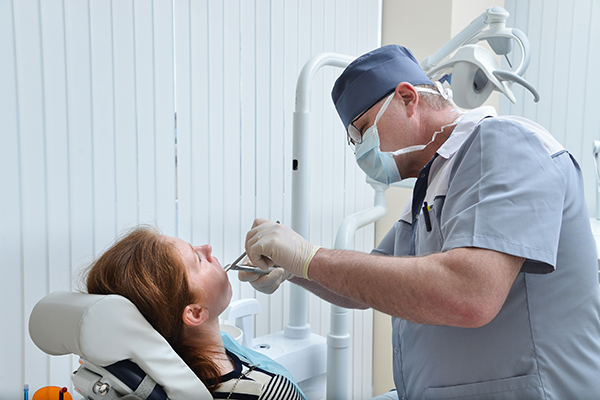
Expert Tooth Extractions in Coral Springs
At Lakeview Dental of Coral Springs, our primary goal is to preserve your natural teeth whenever possible. However, certain circumstances make tooth extractions necessary to protect your overall oral health. Whether it’s due to decay, damage, or overcrowding, our skilled dental team is committed to making the extraction process as comfortable and stress-free as possible. We utilize the latest techniques and pain management options to ensure you receive the best care.
When Is a Tooth Extraction Necessary?
Tooth extractions are often the last resort when other treatments, such as fillings, crowns, or root canals, are not viable. Here are some common reasons why a tooth extraction might be necessary:
- Severe Decay or Infection: When a tooth is extensively decayed or infected, and the damage extends to the pulp (the inner part of the tooth containing nerves and blood vessels), a root canal may not be sufficient to save it. In such cases, extraction helps prevent the spread of infection to other teeth or the jawbone.
- Impacted Wisdom Teeth: Wisdom teeth, or third molars, are the last to emerge, usually between the ages of 17 and 25. Often, there isn’t enough space in the mouth for these teeth to come in properly, leading to impaction. Impacted wisdom teeth can cause pain, infection, and damage to adjacent teeth, necessitating their removal.
- Overcrowding: In cases where the mouth is too small to accommodate all the teeth, extractions may be necessary to make space for proper alignment. This is often done in preparation for orthodontic treatment, such as braces.
- Gum Disease: Advanced periodontal (gum) disease can loosen teeth and damage the surrounding bone. When teeth become loose and cannot be saved with periodontal treatment, extraction is necessary to maintain overall oral health.
- Broken or Fractured Teeth: Teeth that are severely broken or fractured beyond repair may need to be extracted, especially if the fracture extends below the gum line, compromising the tooth’s structure.
Types of Tooth Extractions
The type of extraction you need depends on the condition of the tooth and its location. At Lakeview Dental of Coral Springs, we offer two main types of tooth extractions:
- Simple Extraction: This is performed on a tooth that is visible above the gum line and can be easily removed with forceps. Simple extractions are typically quick and are done under local anesthesia, ensuring that you feel no pain during the procedure. You may feel some pressure as the tooth is loosened and removed, but the process is generally straightforward.
- Surgical Extraction: A surgical extraction is more complex and is necessary when the tooth has not fully erupted (as in the case of impacted wisdom teeth) or when the tooth has broken off at the gum line. Surgical extractions involve making a small incision in the gum to access the tooth. In some cases, the tooth may need to be sectioned into smaller pieces for easier removal. This procedure is also done under local anesthesia, with sedation options available for your comfort.

What to Expect During the Procedure
Understanding what to expect during a tooth extraction can help alleviate anxiety and prepare you for the procedure:
- Consultation and Evaluation: Before the extraction, our dentist will conduct a thorough examination of your mouth and take x-rays to assess the condition of the tooth and surrounding bone. This helps determine the best approach for the extraction and ensures that any potential complications are identified.
- Anesthesia: Whether you’re undergoing a simple or surgical extraction, you will receive local anesthesia to numb the area around the tooth. For patients who feel anxious about the procedure, sedation options such as nitrous oxide (laughing gas) or oral sedation are available to help you relax.
- Extraction Process: For a simple extraction, the dentist will use an elevator to loosen the tooth, followed by forceps to remove it from the socket. In a surgical extraction, the dentist will make a small incision in the gum and may remove bone around the tooth or section the tooth into pieces before removal.
- Post-Extraction Care: After the tooth is removed, the dentist will place gauze over the extraction site to control bleeding and promote clot formation. If stitches are needed, they will be placed to close the incision. You will receive detailed aftercare instructions to ensure proper healing.
Aftercare: Healing After a Tooth Extraction
Proper aftercare is crucial for a smooth and speedy recovery following a tooth extraction. Here are some important steps to follow:
- Gauze Application: Keep the gauze pad in place for 30-45 minutes after the procedure to help form a blood clot. If bleeding persists, replace the gauze and bite down gently for another 30 minutes.
- Pain Management: It’s normal to experience some discomfort after the extraction. Over-the-counter pain relievers like ibuprofen or acetaminophen can help manage the pain. If prescribed, take any medications as directed by your dentist.
- Swelling Reduction: Apply an ice pack to the outside of your cheek in the area of the extraction for 20 minutes at a time to reduce swelling. Do this for the first 24 hours as needed.
- Rest and Recovery: Take it easy for the first 24 hours after your extraction. Avoid strenuous activities that could increase blood pressure and lead to more bleeding.
- Diet and Hydration: Stick to soft foods such as yogurt, applesauce, mashed potatoes, and smoothies for the first few days. Avoid hot, spicy, or crunchy foods that could irritate the extraction site. Drink plenty of fluids, but avoid using straws, as the sucking motion can dislodge the blood clot and lead to dry socket.
- Oral Hygiene: Keep your mouth clean, but be gentle around the extraction site. You can brush your teeth, but avoid the extraction area for the first day. After 24 hours, rinse your mouth gently with warm salt water several times a day to keep the area clean and promote healing.
- Avoid Smoking and Alcohol: Smoking and alcohol can interfere with the healing process and increase the risk of complications such as dry socket. It’s best to avoid these for at least 48 hours after the extraction.

Signs of Complications: When to Call Your Dentist
While most tooth extractions heal without any issues, it’s important to be aware of signs that may indicate complications:
- Prolonged Bleeding: If bleeding continues for more than 24 hours despite applying pressure with gauze, contact our office.
- Severe Pain: Some discomfort is normal, but if you experience severe or worsening pain, especially if it radiates to your ear, you may have developed a dry socket or infection.
- Swelling: Some swelling is expected, but if it becomes excessive or is accompanied by fever, this could indicate an infection.
- Nausea or Vomiting: If you experience nausea or vomiting after the extraction, it may be a reaction to the anesthesia or medication. Contact our office for advice.
Future Dental Care: Replacing an Extracted Tooth
After a tooth extraction, it’s important to consider your options for replacing the missing tooth to maintain the health and function of your smile. At Lakeview Dental of Coral Springs, we offer several tooth replacement options:
- Dental Implants: Implants are a permanent solution that involves placing a titanium post into the jawbone to act as an artificial tooth root. A crown is then attached to the implant, providing a natural-looking and durable replacement tooth.
- Bridges: A dental bridge uses adjacent teeth as anchors for a false tooth, filling the gap left by the extracted tooth. Bridges are a good option if you’re missing one or a few teeth in a row.
- Dentures: For patients missing multiple teeth, partial or full dentures can restore the appearance and function of your smile. Modern dentures are more comfortable and natural-looking than ever before.
Schedule Your Tooth Extraction Consultation
If you think you might need a tooth extraction, don’t hesitate to contact Lakeview Dental of Coral Springs. Our experienced team will guide you through the process, ensuring your comfort and providing the care you need. We’ll discuss your options and help you make an informed decision about your oral health. Schedule your consultation online or call us at (954) 738-1398 today.
